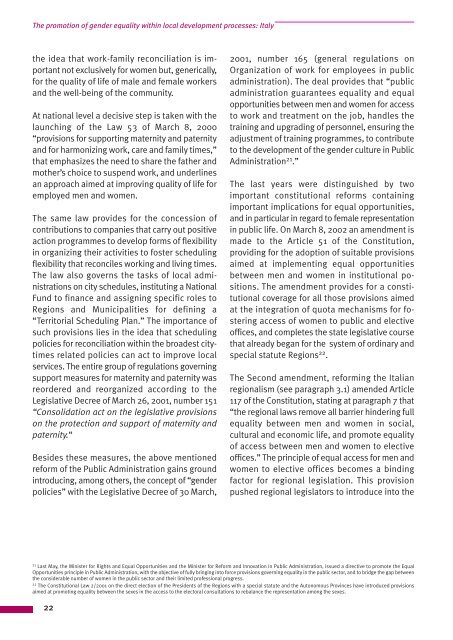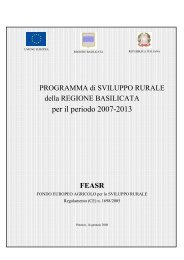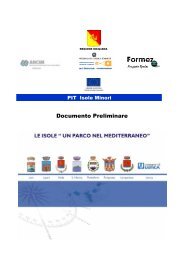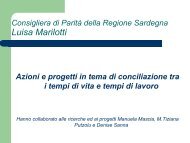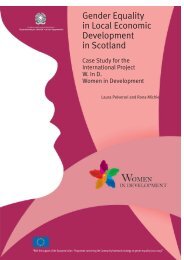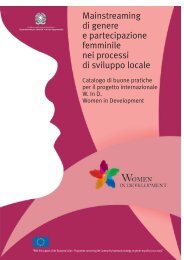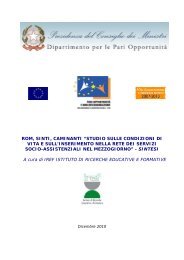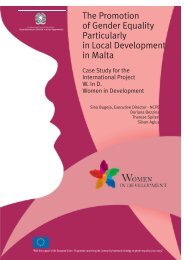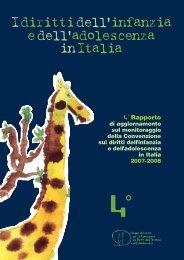The Promotion of Gender Equality within Local Development ...
The Promotion of Gender Equality within Local Development ...
The Promotion of Gender Equality within Local Development ...
Create successful ePaper yourself
Turn your PDF publications into a flip-book with our unique Google optimized e-Paper software.
<strong>The</strong> promotion <strong>of</strong> gender equality <strong>within</strong> local development processes: Italythe idea that work-family reconciliation is importantnot exclusively for women but, generically,for the quality <strong>of</strong> life <strong>of</strong> male and female workersand the well-being <strong>of</strong> the community.At national level a decisive step is taken with thelaunching <strong>of</strong> the Law 53 <strong>of</strong> March 8, 2000“provisions for supporting maternity and paternityand for harmonizing work, care and family times,”that emphasizes the need to share the father andmother’s choice to suspend work, and underlinesan approach aimed at improving quality <strong>of</strong> life foremployed men and women.<strong>The</strong> same law provides for the concession <strong>of</strong>contributions to companies that carry out positiveaction programmes to develop forms <strong>of</strong> flexibilityin organizing their activities to foster schedulingflexibility that reconciles working and living times.<strong>The</strong> law also governs the tasks <strong>of</strong> local administrationson city schedules, instituting a NationalFund to finance and assigning specific roles toRegions and Municipalities for defining a“Territorial Scheduling Plan.” <strong>The</strong> importance <strong>of</strong>such provisions lies in the idea that schedulingpolicies for reconciliation <strong>within</strong> the broadest citytimesrelated policies can act to improve localservices. <strong>The</strong> entire group <strong>of</strong> regulations governingsupport measures for maternity and paternity wasreordered and reorganized according to theLegislative Decree <strong>of</strong> March 26, 2001, number 151“Consolidation act on the legislative provisionson the protection and support <strong>of</strong> maternity andpaternity.“Besides these measures, the above mentionedreform <strong>of</strong> the Public Administration gains groundintroducing, among others, the concept <strong>of</strong> “genderpolicies” with the Legislative Decree <strong>of</strong> 30 March,2001, number 165 (general regulations onOrganization <strong>of</strong> work for employees in publicadministration). <strong>The</strong> deal provides that “publicadministration guarantees equality and equalopportunities between men and women for accessto work and treatment on the job, handles thetraining and upgrading <strong>of</strong> personnel, ensuring theadjustment <strong>of</strong> training programmes, to contributeto the development <strong>of</strong> the gender culture in PublicAdministration 21 .”<strong>The</strong> last years were distinguished by twoimportant constitutional reforms containingimportant implications for equal opportunities,and in particular in regard to female representationin public life. On March 8, 2002 an amendment ismade to the Article 51 <strong>of</strong> the Constitution,providing for the adoption <strong>of</strong> suitable provisionsaimed at implementing equal opportunitiesbetween men and women in institutional positions.<strong>The</strong> amendment provides for a constitutionalcoverage for all those provisions aimedat the integration <strong>of</strong> quota mechanisms for fosteringaccess <strong>of</strong> women to public and elective<strong>of</strong>fices, and completes the state legislative coursethat already began for the system <strong>of</strong> ordinary andspecial statute Regions 22 .<strong>The</strong> Second amendment, reforming the Italianregionalism (see paragraph 3.1) amended Article117 <strong>of</strong> the Constitution, stating at paragraph 7 that“the regional laws remove all barrier hindering fullequality between men and women in social,cultural and economic life, and promote equality<strong>of</strong> access between men and women to elective<strong>of</strong>fices.” <strong>The</strong> principle <strong>of</strong> equal access for men andwomen to elective <strong>of</strong>fices becomes a bindingfactor for regional legislation. This provisionpushed regional legislators to introduce into the21 Last May, the Minister for Rights and Equal Opportunities and the Minister for Reform and Innovation in Public Administration, issued a directive to promote the EqualOpportunities principle in Public Administration, with the objective <strong>of</strong> fully bringing into force provisions governing equality in the public sector, and to bridge the gap betweenthe considerable number <strong>of</strong> women in the public sector and their limited pr<strong>of</strong>essional progress.22 <strong>The</strong> Constitutional Law 2/2001 on the direct election <strong>of</strong> the Presidents <strong>of</strong> the Regions with a special statute and the Autonomous Provinces have introduced provisionsaimed at promoting equality between the sexes in the access to the electoral consultations to rebalance the representation among the sexes.22


